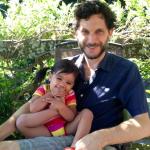Musings from Students of the Pardes Institute of Jewish Studies in Jerusalem
Posted on November 2, 2014 by David Curiel
 One of my objectives this year is to set aside my (considerable) judgment surrounding the Israel/Palestine conflict and try to listen deeply to as many different voices within it. I also, with much humility, wish to take an active witness role in the vein of our teacher and rabbi Abraham Joshua Heschel, who, with much broader shoulders and deeper courage of his convictions, said, “when I was marching at Selma, I felt as if my feet were praying.” My first installment takes part in a context that I confess is an idealogical comfort zone for me, helping, with Rabbis for Human Rights (RHR), a Palestinian family harvest their olives on the West Bank.
One of my objectives this year is to set aside my (considerable) judgment surrounding the Israel/Palestine conflict and try to listen deeply to as many different voices within it. I also, with much humility, wish to take an active witness role in the vein of our teacher and rabbi Abraham Joshua Heschel, who, with much broader shoulders and deeper courage of his convictions, said, “when I was marching at Selma, I felt as if my feet were praying.” My first installment takes part in a context that I confess is an idealogical comfort zone for me, helping, with Rabbis for Human Rights (RHR), a Palestinian family harvest their olives on the West Bank.
Friday morning broke grey, with puddles still on the ground from the previous night’s rain (thank G-d), and more rain in the forecast. As I made my way to Liberty Bell park for our rendezvous, I wondered how this might affect our plans. Within minutes of meeting R’Yehiel of RHR (along with my fellow volunteers for the day) he let us know that previous arrangements were out the window: the farmer we were meant to help in Sinjil that day was not going out to pick olives in the mud. We boarded the bus, and he started making phone calls.
While he waited for return calls, we wound our way out of Jerusalem and through the security checkpoint without batting an eyelash, and heard a little bit about RHR’s 12-year involvement in the Palestinian olive harvest. The short story is that most, if not all, Palestinian agricultural land is in so-called “area C,” which is under Israeli military and civil rule, and not coincidentally where all the Jewish settlements are. And there’s the rub.
Before RHR won a Supreme Court case in 2006 requiring the army to protect the olive harvest, Jewish settlers would frequently harass, physically attack or otherwise deny these farmers access to their groves. Because, you see, the Palestinian people live in either areas A (cities) or B (villages), physically separated from their land. More on RHR’s work in the olive harvest then and now can be found on their website, but suffice it to say that the harassment is far from over. Our original destination, Singil, is surrounded by Jewish settlements on three sides and is often the object of violence from aggressive elements within them. But it was muddy, so no go.
Driving north along road 60, the main artery through the West Bank, we occasionally got breathtaking views down ridges where the Jordan River Valley glimmered in the distance, and Jordan’s mountains rose on the other side. The landscape is stark–vaguely martian–with bleached rock showing its strata when the hills dipped precipitously, and on the gentler slopes, age-old terraces held olive trees and other crops. Once in a while, a bend in the road revealed a Jewish settlement or a Palestinian village, differentiated, with one or two exceptions, by the finish on the roof: red pitched for settlements, flat white for villages.
While we drove, R’Yehiel was intermittently on his phone. He explained to us that a farmer had picked his olives a day or two before, and had been run off his land (I can’t recall if it was by settlers or the army), and had been forced to leave his crop sitting there in bags. The rabbi was calling around to his contacts to see if safe passage could be given the man to return and collect his crop. After a stretch, I heard the last bit of conversation on Yehiel’s last call, “תודה! עשית מיצוה.” Thank you! You’ve done a mitzvah.) It had been a local army commander, calling back to verify that he had just escorted the farmer with his crop.
The harvest itself was fun and uncomplicated. Abu Rami, our driver and inveterate smoker, found us a family in Sawiya who was harvesting that day. The thrill of approaching a branch laden with olives was visceral; climbing the trees to reach the fruit on the farthest bough, a childhood joy. Our hosts were gracious, bringing about more sweets and caffeine in three hours than I had reason to consume, but which I accepted gratefully, nonetheless. The family lives adjacent to their grove, and haven’t suffered any harvest-related violence, but before the rains cut our time short, they told us of a recent firebombing of their local school, just down the road, by violent settler elements. “We just want to live free of the occupation,” they said, with evident emotion.
And in that moment, in a modest field not so unlike any other, and the rain about to fall, it didn’t seem like too much to ask.